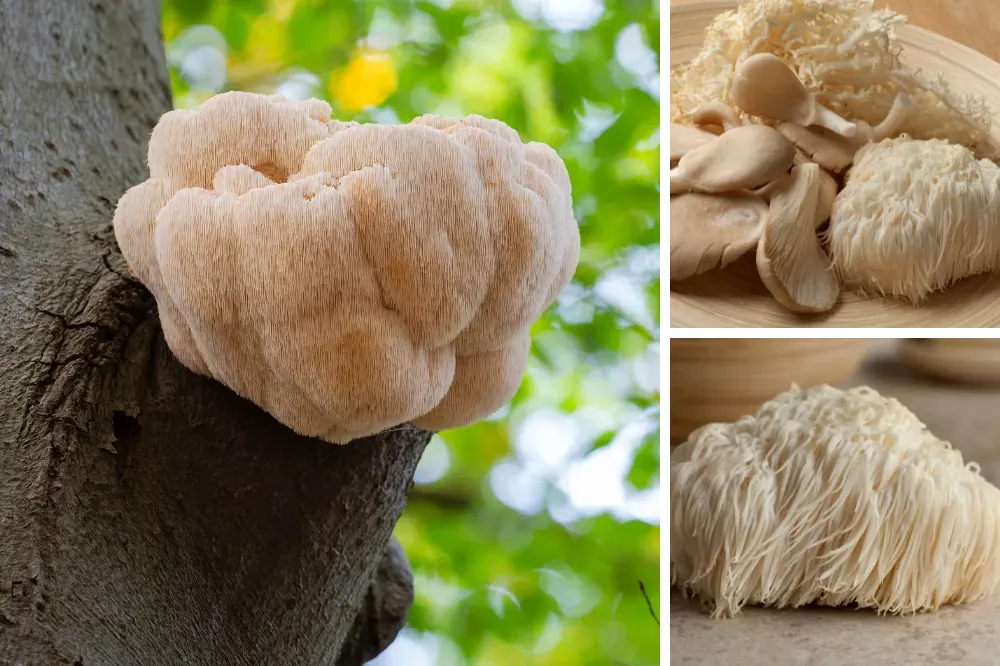Key Takeaways:
- Lion's Mane Mushroom: Known for its potential to enhance memory and cognitive function.
- Scientific Backing: Research suggests it boosts nerve growth and brain cell regeneration.
- Traditional and Modern Use: Used in traditional Chinese medicine and supported by recent studies.
Introduction
Lion's mane mushroom, scientifically known as Hericium erinaceus, has been a staple in traditional Chinese medicine for centuries. Recently, it has gained popularity in the West for its potential cognitive benefits, particularly in improving memory. But does lion's mane really improve memory? This article delves into the science behind this fascinating mushroom, exploring its active components, effects on brain health, and the research supporting its use.

The Science Behind Lion's Mane
Lion's mane mushroom contains several bioactive compounds that are believed to contribute to its cognitive benefits. These include hericenones and erinacines, which have been shown to stimulate the production of nerve growth factor (NGF). NGF is crucial for the growth, maintenance, and survival of neurons, the cells responsible for transmitting information in the brain.
Research conducted at the Queensland Brain Institute has demonstrated that these compounds can cross the blood-brain barrier, a selective barrier that protects the brain from harmful substances. This ability to penetrate the brain's defenses is significant, as it allows the active components to directly influence brain function and health.
Brain Cell Growth and Regeneration
One of the most compelling aspects of lion's mane mushroom is its potential to promote brain cell growth and regeneration. Studies have shown that consuming lion's mane can lead to the growth of new neurons and the repair of damaged ones. This is particularly important for individuals suffering from neurodegenerative cognitive disorders, such as Alzheimer's and Parkinson's disease.
In laboratory tests, researchers measured the effects of lion's mane on cultured brain cells and found that it significantly increased the size of growth cones, the structures at the tips of neuron projections that play a crucial role in neuron connectivity. This suggests that lion's mane may enhance the brain's ability to form new connections, which is essential for memory and learning.
Cognitive Benefits and Memory Enhancement
The cognitive benefits of lion's mane mushroom extend beyond just brain cell growth. Research suggests that it can improve memory formation and cognitive performance. In a double-blind study conducted in Japan, participants with mild cognitive impairment who took lion's mane supplements showed significant improvements in their cognitive abilities compared to the placebo group.

Another study published in the Journal of Neurochemistry found that lion's mane mushroom extract enhanced recognition memory in mice. This type of memory is crucial for identifying previously encountered objects, people, and places. The study's findings indicate that lion's mane may have a significant impact on memory enhancement and overall cognitive health.
Traditional Chinese Medicine and Modern Use
Lion's mane mushroom has been used in traditional Chinese medicine for centuries to treat various ailments, including stomach ulcers and chronic inflammation. Its medicinal properties are attributed to its rich content of bioactive compounds, which have been shown to have anti-inflammatory and antioxidant effects.
In modern times, lion's mane has gained popularity as a dietary supplement for its potential cognitive benefits. Many people consume lion's mane extract or supplements to boost their brain function and maintain mental health. The mushroom's ability to stimulate the production of nerve growth factor and promote brain cell regeneration makes it a promising natural source for improving memory and cognitive function.
Pre-Clinical and Clinical Research
Pre-clinical testing has found that lion's mane mushroom compounds can regenerate brain cells and improve cognitive performance in animal studies. For example, a study conducted by researchers at Chungbuk National University in South Korea found that hericerin derivatives from lion's mane promoted the growth of neurons and enhanced memory in mice.
Clinical trials in humans have also shown promising results. A study conducted at Gachon University in the Republic of Korea found that participants who took lion's mane supplements experienced significant improvements in cognitive function and memory compared to those who took a placebo. These findings suggest that lion's mane may have potential health benefits for individuals with age-related cognitive decline and mild Alzheimer's disease.
Mechanisms of Action
The mechanisms by which lion's mane mushroom enhances memory and cognitive function are still being explored. However, research suggests that its bioactive compounds may influence several neurotrophic pathways, including the production of nerve growth factor and the activation of neurotrophic activity.
One study conducted by researchers at the University of Queensland found that lion's mane extract increased the production of nerve growth factor in cultured brain cells. This increase in NGF production is believed to be one of the key components underlying the mushroom's cognitive benefits. Additionally, lion's mane has been shown to reduce oxidative stress and chronic inflammation, both of which can negatively impact brain health.
Potential Benefits for Neurodegenerative Disorders
Lion's mane mushroom may offer potential benefits for individuals with neurodegenerative disorders, such as Alzheimer's and Parkinson's disease. Research suggests that the mushroom's bioactive compounds can protect against brain damage and promote the regeneration of nerve cells, which are often damaged in these conditions.

A study published in the Journal of Neurochemistry found that lion's mane extract reduced depressive behaviors and improved cognitive function in mice with induced brain damage. These findings indicate that lion's mane may have a protective effect on the brain and could potentially be used as a therapeutic agent for neurodegenerative disorders.
Lion's Mane and the Nervous System
The nervous system plays a crucial role in regulating various bodily functions, including memory and cognitive abilities. Lion's mane mushroom has been shown to have a positive impact on the nervous system by promoting the growth of neurons and enhancing nerve cell communication.
Research conducted by CNGbio Co. in South Korea found that lion's mane extract increased the production of nerve growth factor in central hippocampal neurons, which are essential for memory formation and cognitive function. This increase in NGF production suggests that lion's mane may help maintain the health of the nervous system and improve cognitive abilities.
Lion's Mane Supplements and Dosage
Lion's mane supplements are available in various forms, including capsules, powders, and extracts. The dosage of lion's mane supplements can vary depending on the product and the individual's needs. It is important to follow the recommended dosage instructions provided by the manufacturer or consult with a healthcare provider before starting any new supplement regimen.

Research suggests that a daily dose of 500-1000 mg of lion's mane extract may be effective for improving memory and cognitive function. However, further research is needed to determine the optimal dosage and long-term effects of lion's mane supplementation.
Potential Side Effects and Safety
Lion's mane mushroom is generally considered safe for consumption, with few reported side effects. However, some individuals may experience mild digestive issues, such as stomach discomfort or diarrhea, when consuming lion's mane supplements. It is important to start with a low dose and gradually increase it to minimize the risk of side effects.
Individuals with allergies to mushrooms should avoid lion's mane supplements, as they may cause allergic reactions. Additionally, it is advisable to consult with a healthcare provider before taking lion's mane supplements, especially if you have any pre-existing medical conditions or are taking other medications.
Lion's Mane in Traditional Medicine
Lion's mane mushroom has a long history of use in traditional medicine, particularly in Asian countries. In traditional Chinese medicine, lion's mane is believed to have various health benefits, including improving digestion, boosting the immune system, and enhancing cognitive function.
In Japan, lion's mane is known as "yamabushitake" and is used to promote overall health and longevity. The mushroom's medicinal properties are attributed to its rich content of bioactive compounds, which have been shown to have anti-inflammatory, antioxidant, and neuroprotective effects.
Modern Research and Future Directions
Modern research on lion's mane mushroom has provided valuable insights into its potential cognitive benefits and mechanisms of action. However, further research is needed to fully understand the mushroom's effects on brain health and its potential as a therapeutic agent for neurodegenerative disorders.

Ongoing research projects at institutions such as the Queensland Brain Institute and Chungbuk National University are exploring the molecular mechanisms of lion's mane and its impact on brain function. These studies aim to identify the bioactive compounds responsible for the mushroom's cognitive benefits and determine their potential applications in healthcare.
Case Studies and Anecdotal Evidence
In addition to scientific research, there are numerous anecdotal reports of individuals experiencing cognitive benefits from consuming lion's mane supplements. For example, Ramon Martinez, a 65-year-old retiree, reported significant improvements in his memory and cognitive function after taking lion's mane extract for six months. He noted that he felt more mentally sharp and had an easier time recalling information.
Another case study involves Frederic Meunier, a 45-year-old software engineer, who started taking lion's mane supplements to combat age-related cognitive decline. After three months of supplementation, he reported enhanced memory and improved focus, allowing him to perform better at work and in his daily activities.
Lion's Mane and Cognitive Health
Maintaining cognitive health is essential for overall well-being and quality of life. Lion's mane mushroom has shown promise as a natural supplement for supporting cognitive health and improving memory. Its ability to stimulate the production of nerve growth factor and promote brain cell regeneration makes it a valuable addition to a brain-healthy diet.
Incorporating lion's mane into your daily routine, whether through dietary supplements or culinary use, may help enhance memory and cognitive function. However, it is important to combine supplementation with other healthy lifestyle practices, such as regular exercise, a balanced diet, and mental stimulation, to achieve optimal cognitive health.
Conclusion
With its rich history in traditional medicine and growing body of scientific research, Lion's mane mushroom offers promising potential for improving memory and cognitive function. Its bioactive compounds, such as hericenones and erinacines, have been shown to stimulate nerve growth, promote brain cell regeneration, and enhance cognitive abilities.
While further research is needed to fully understand the mechanisms and long-term effects of lion's mane supplementation, current evidence suggests that this medicinal mushroom may be a valuable natural source for supporting brain health and cognitive performance. Whether you are looking to boost your memory, protect against age-related cognitive decline, or simply maintain overall mental health, lion's mane mushroom may be worth considering as part of your wellness routine.
Summary
Lion's mane mushroom, known for its cognitive benefits, has been used in traditional Chinese medicine for centuries. Recent scientific research supports its potential to improve memory and cognitive function by stimulating nerve growth and promoting brain cell regeneration. Studies have shown that lion's mane can enhance memory formation, cognitive performance, and protect against neurodegenerative disorders. While further research is needed, current evidence suggests that lion's mane may be a valuable natural supplement for supporting brain health and cognitive abilities.
FAQ
1. What are the active components in lion's mane mushroom that improve memory?
Lion's mane mushroom contains bioactive compounds such as hericenones and erinacines, which have been shown to stimulate the production of nerve growth factor (NGF). NGF is crucial for the growth, maintenance, and survival of neurons, which are essential for memory and cognitive function.
2. Are there any side effects associated with consuming lion's mane supplements?
Lion's mane mushroom is generally considered safe for consumption, with few reported side effects. Some individuals may experience mild digestive issues, such as stomach discomfort or diarrhea. It is important to start with a low dose and gradually increase it to minimize the risk of side effects. Individuals with allergies to mushrooms should avoid lion's mane supplements.
3. How long does it take to see cognitive benefits from lion's mane supplementation?
The time it takes to see cognitive benefits from lion's mane supplementation can vary depending on the individual and the dosage. Some studies have shown significant improvements in cognitive function and memory after several weeks to a few months of supplementation. It is important to follow the recommended dosage instructions and consult with a healthcare provider for personalized advice.













